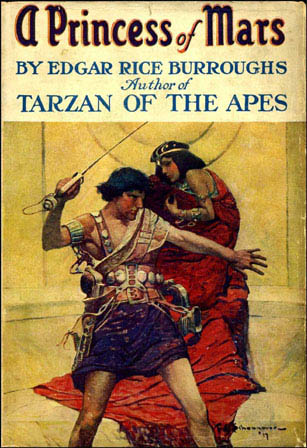 |
| English: Cover art by Frank E. Schoonover from A Princess of Mars by Edgar Rice Burroughs, McClurg, 1917. Uploaded by User:BPK2. Español: John Carter y Dejah Thoris en la cubierta de la primera edición de Una Princesa de Marte por Edgar Rice Burroughs. Illustrador: Frank E. Schoonover. Bajada por User:BPK2. (Photo credit: Wikipedia) |
This classic, which I mistakenly thought I’d read in my
youth, came up amongst some free books on my iPad. Once I started to explore,
to see whether I had, in fact, read it, I was hooked.
The story is typical of the author, of course, and the style
is dated, as you’d expect. But there is a quality to the writing that keeps the
reader engaged. Full of what modern readers would perceive as politically
incorrect attitudes, bursting with out-dated ideas about the Red Planet, it may
be, but the story moves at a pace, with plenty of action to keep the reader
interested.
There’s a good deal of imagination displayed in the solutions
to various envisaged problems of living on a dying planet. And the wonderful
exaggeration of an Earthman’s prowess on a planet with lower gravity is
entertaining rather than irritating.
Written almost entirely as narrative, telling rather than showing
and therefore breaking umpteen ‘writing’ rules, this story relies on its
powerful plot and strong characters for its success. It may well be dated, but
it still entertains. And I love the way the author refuses to be deflected from
his tale by the sheer incredibility of his hero’s passage from Earth to Mars
and back again. No explanation is given for this remarkable feat, and it’s
simple acceptance as an inexplicable happening fits well with the story.
There are some wonderful examples of mixed moral stances,
with all sexual references dealt with indirectly and under the covers. The
violence and war, however, is accepted as perfectly normal. A reflection,
perhaps, of the times and the land in which the author lived at the point of
writing? Have things changed very much, I wonder.
I enjoyed this piece of old science fiction and recommend it
to those who have grown up with the genre over many years. Younger readers
might find the nature of the telling and the idiosyncrasies of the story a
little too difficult to take, however.

No comments:
Post a Comment